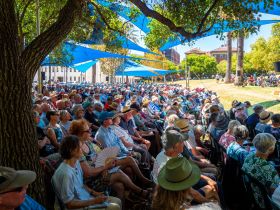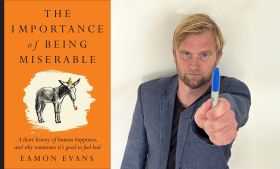Syrian refugees arrive near Molyvos, Lesbos on an overload dinghy, 2015. Editorial credit: Nicolas Economou / Shutterstock.com.
Edited by Benita Lipps, Engaging Stages: Good Practice in Creative Audience Development is a new, hands-on guide for theatre-makers and creative leaders. Published by the Theatron Engaging Stages Network Europe, it contains 30 contributions and case studies from 17 leading performing arts organisations in 10 European countries, including Toneelhuis Antwerp (BE), HELLERAU European Center for the Arts Dresden (DE), Young Vic Theatre (UK), TR Warszawa (PL), Det Norske Teatret (NO), Bunker (SI), the European Commission and Clore Leadership Programme.
This extract presents practical advice for theatre companies and theatre artists wishing to work closely and respectfully with refugees and other marginalised communities.
* * *
Socially responsible and responsive to the needs of local audiences: that’s what most theatres aim to be. Addressing marginalised communities can, however, push theatres outside their comfort zones, in terms of topics, artists’ experiences or audiences. Where should a venue start when all it has are good intentions?
This article might be a good place. It sets out five basic rules of engagement with marginalised communities in theatre settings. Drawing on extensive experiences of Theatron venues, the text signposts collaborative methods, ethical standards and logistical adjustments theatres adopt, before exploring engagement with majority audiences. Spoiler alert: projects that involve minorities won’t break the box office, but may require theatres to change their usual modus operandi. Giving up creative control is often the first step. In other words:
Don’t be the boss
‘Where are the refugees and immigrants in our meetings?’ This question, posed during the Refugees Welcome Theatron Workshop in Dresden, came from Fadi Leon, a Syrian collaborator of Sweden’s Cullberg Ballet. In Leon’s words, a collaboration with marginalised participants means allowing them to shape the project thematically, formally, and logistically, from the outset – not making decisions for them.
Theatron venues offer many different examples of such equality-based collaborations. The Young Vic’s work with female carers on Turning A Little Further, meant adjusting the rehearsal length and location to fit their schedule, and inviting participation in both devising and performance stages. Hellerau, another Theatron partner, co-curates events like Word Asylum with local refugees and is making long-term plans that would enable refugees to take on management rather than volunteer and artistic positions only.
Have a clear conscience
When it comes to working with marginalised communities, good intentions mean little without sound ethics. Within the Theatron network, this means designing projects that are free of patronising, responsive to marginalised collaborators’ needs, and aware of theatre’s blind spots. The intention should be to empower marginalised communities, through giving them the space to speak, be heard, and redefine who they are and what art can do for them.
Setting our clear ethical guidelines before the start of the project is standard practice in theatres like the Young Vic. Here, artists have to sign on to the theatre’s ethos before commencing work on any outreach project; this includes the credo of never mining marginalised groups for interesting stories. Theatron venues also recommend establishing relationships with marginalised collaborators in person, and in small steps, allowing time to build trust before commencing creative work.
Expect problems
The structural, institutional and cultural challenges faced by marginalised communities are difficult to keep outside the rehearsal room; different demographics also face different issues. Theatron members identify the language barrier, the difficulty of following a strict schedule, and the incompatibility of the venue’s usual devising process with such sensitive projects, as some of the most common problems that arise when working with refugees.
Tips, advice and resources from venues with more experience in the field can be crucial in anticipating likely problems; this kind of exchange is common amongst Theatron venues. The network’s key recommendations also include recognising the individuals within a group (not all refugees will speak the same language for example); adjusting to cultural differences (men and women may not be able to work together); and accepting theatres shouldn’t do social work – but recognise how their skills and expertise can contribute to inclusion or empowerment.
Think good, not big
Theatron members who successfully engage with marginalised groups invest time, money and resources into projects that won’t be a commercial hit or even produce measurable outcomes. One of the key findings of the Refugees Welcome Theatron Workshop was that metrics funders look for don’t always apply; both venues and subsidising bodies need to adjust, and stop equating ‘good results’ with ‘big numbers’.
An invitation to the venue, so that funders can experience the work with marginalised communities, can entice such adjustment. For theatres, Theatron member Young Vic recommends starting a project with just several members of a marginalised group who devise a performance, before inviting up to 20 to take part in thematic workshops, and finally motivating as many as possible to see the performance. This ‘ripple effect’ approach to engaging marginalised communities puts emphasis on the quality, rather than the sheer quantity of relationships created.
Don’t segregate the audiences
Artistic programmes by and about marginalised groups need to engage with the ‘typical’, majority audiences as well. For Theatron member Hellerau, this means gathering a mixed audience that reflects a mixed society around refugee projects, as a way of contributing to the city’s deliberation on the crises. The theatre believes an encounter between a Dresden local and a refugee can go a long way to dismantling prejudice and fears.
Both Hellerau and fellow Theatron partner Divadlo Archa devise projects that facilitate meetings between majority and minority audiences. The former is well known for Kitchen Talk, a regular event where international guests – immigrants, refugees, policy makers – and local audiences come together to cook and talk. The latter specialises in documentary theatre that puts stories of often-invisible minorities, like Roma, or the disabled, in front of majority, Czech audiences.
Conclusion
Performances and projects about experiences of marginalised com- munities should be made in creative collaboration with community members and built on strong ethical grounds. As the vast experience of Theatron venues shows, practical adjustments, in terms of rehearsal structure for example, are almost always necessary. Working with marginalised communities is unlikely to produce a large commercial hit; however, these projects should still be made with non-marginalised audiences in mind. By bringing minority and majority audiences together, theatres can foster understanding and inclusion in their local communities.
What now?
‘Just do it!’ is a mantra of many Theatron venues collaborating with marginalised groups. Follow Hellerau’s advice – figure out what the pressing issues in your city are, and start from there. For a detailed exploration of what this kind of work entails, from ethics to practicalities, check out video documentation from Theatron’s Refugees Welcome Workshop. And for advice and support from venues who’ve been there and done that, join the Engaging Stages Network Europe.
Engaging Stages is available for purchase online (£12.50 or AU $21.90).






